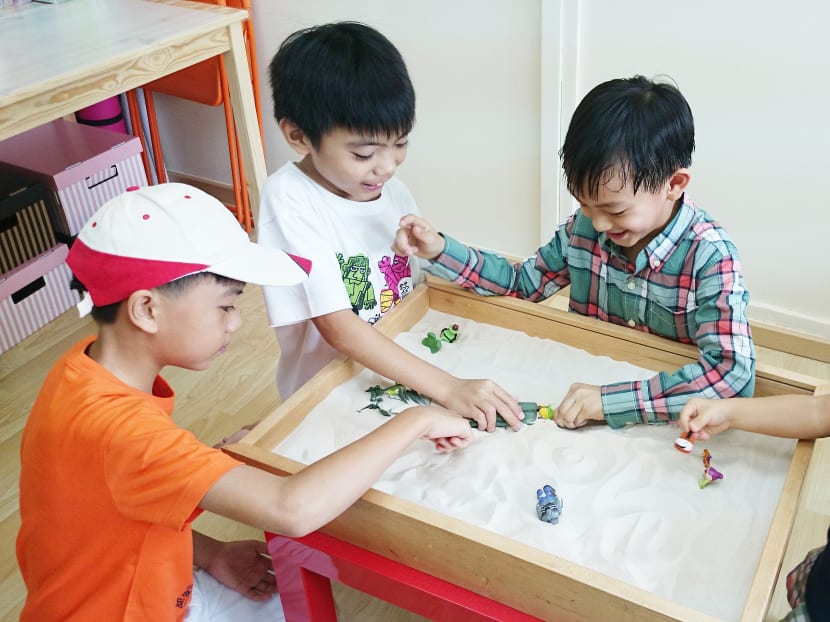Play therapies help children with special needs
SINGAPORE — Equipped with colourful toys ranging from puppets, dolls and puzzles to blocks and art materials, play therapist Marina Lim’s office at Creative Play Therapy is more than an inviting playroom. It is where the healing process begins for children.

Play therapy can improve children’s perceptions about themselves and help them adjust socially, as seen in this posed photo. Photo: Creative Play Therapy
SINGAPORE — Equipped with colourful toys ranging from puppets, dolls and puzzles to blocks and art materials, play therapist Marina Lim’s office at Creative Play Therapy is more than an inviting playroom. It is where the healing process begins for children.
One of 18 local play therapists registered under Play Therapy Singapore, which is affiliated with Play Therapy International in the United Kingdom, Ms Lim conducts play therapy sessions for children and teenagers, helping them navigate emotional, psychological and social issues through play.
“The playroom is a safe and confidential environment where children are allowed to choose what they want to play with and how they wish to play. This gives them a chance to process their problems at their own pace, understanding and ability,” said Ms Lim, who also provides coaching to families caring for special-needs children, so they can carry out therapeutic play methods at home.
The use of toys and creative arts is an established therapy technique for children. In places such as the United States, the United Kingdom and Australia, therapeutic play is often part of the early intervention routine for children with special needs, said Ms Lim.
The trend has also caught on in Singapore. In recent years, an increasing number of local healthcare providers and organisations have begun using creative play to support this group of children.
At KK Women’s and Children’s Hospital (KKH), Hospital Play specialists use toys and play activities to help hospitalised children cope with fear, pain and anxiety about their illness or treatment, thereby creating a more positive hospital experience. The team currently manages about 400 patients each month, ranging from the age of six months to 17 years.
For children with developmental needs, hospital play forms an important part of the hospitalisation experience.
“All children, regardless of their development, may experience challenges if they are hospitalised. However, some children with developmental needs may require more support to help them process and understand the purpose of being in a hospital,” said KKH senior play specialist Tanuja Nair.
The KKH team might prepare young patients for upcoming medical procedures or surgeries through medical play, diversion or distraction techniques, or help them make sense of their diagnosis through stories, she added.
Over at the Institute of Mental Health (IMH), about 80 children generally aged six to 14 underwent play therapy between 2013 and last year. Among them, the proportion having special needs rose from 18 per cent in 2013 to 66 per cent last year, said Dr Ann-Marie Lo Castro, principal clinical psychologist and play therapist at IMH’s Department of Child and Adolescent Psychiatry.
Children with special needs include those with attention deficit hyperactivity disorder, autism spectrum disorder, specific learning difficulties, physical difficulties and intellectual disability.
More than just a fun indulgence, play is a versatile medium from which a child can learn various developmental skills, said Ms Nair. This makes it a holistic early intervention approach for children with special needs. In the hands of a trained practitioner, play therapy can improve the child’s self-concept (perception of themselves), help them adjust better socially, as well as reduce problem behaviour and anxiety, according to Dr Lo Castro.
Besides helping children with special needs, play therapy may also benefit children experiencing abuse, trauma, family problems, difficulties adjusting to new environments and situations, as well as attachment, bereavement and bullying issues, she added.
Outside clinical settings, special-needs children also benefit from regular play.
“Playful interactions are also known to stimulate the production of chemicals in the brain that promote feel-good feelings and suppress pain and distress,” said Dr Lo Castro.
It also helps the brain to build new neuro-pathways, which help children understand their situation and solve problems better, added Ms Lim.
Recognising the importance of play, local non-profit organisations AWWA and Metropolitan YMCA Singapore (MYMCA) have set up special toy libraries to provide access to adaptive toys to children with special needs. Open to the public at a membership fee of S$12 a year, AWWA’s Toy Library has more than 1,000 toys, some of which are specially adapted — with larger switches and buttons for instance.
Since the Toy Library debuted in 2012, the average number of loans — capped at four toys a member for up to four weeks — has doubled from 220 to 440 a month, said Ms Susanna Kho, centre manager, AWWA Resource and Training Centre.
MYMCA’s mobile MY Toy Library programme, where volunteers take specially adapted toys and play activities to special education schools every month, benefits an average of 200 children each year.
Ms Kho from AWWA said having access to adaptive toys enhances the learning and developmental skills of these children, many of whom have difficulty playing with other toys.
“For example, some children with limited fine motor skills, range of motion and strength cannot operate typical switch-operated toys. These toys are modified with a large switch with an extension, which enable or improve the children’s access to these toys. But, most importantly, these toys provide opportunities for parents to interact and bond with their children through play,” said Ms Kho.






